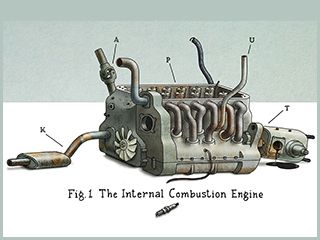Course Description
This course studies the fundamentals of how the design and operation of internal combustion engines affect their performance, efficiency, fuel requirements, and environmental impact. Topics include fluid flow, thermodynamics, combustion, heat transfer and friction phenomena, and fuel properties, with reference to …
This course studies the fundamentals of how the design and operation of internal combustion engines affect their performance, efficiency, fuel requirements, and environmental impact. Topics include fluid flow, thermodynamics, combustion, heat transfer and friction phenomena, and fuel properties, with reference to engine power, efficiency, and emissions. Students examine the design features and operating characteristics of different types of internal combustion engines: spark-ignition, diesel, stratified-charge, and mixed-cycle engines. The class includes lab project in the Engine Laboratory.
Course Info
Learning Resource Types
assignment_turned_in
Problem Sets with Solutions
grading
Exams with Solutions
notes
Lecture Notes

The internal combustion engine. (Image courtesy of Jon Berkeley. License: CC BY-NC-SA.)








